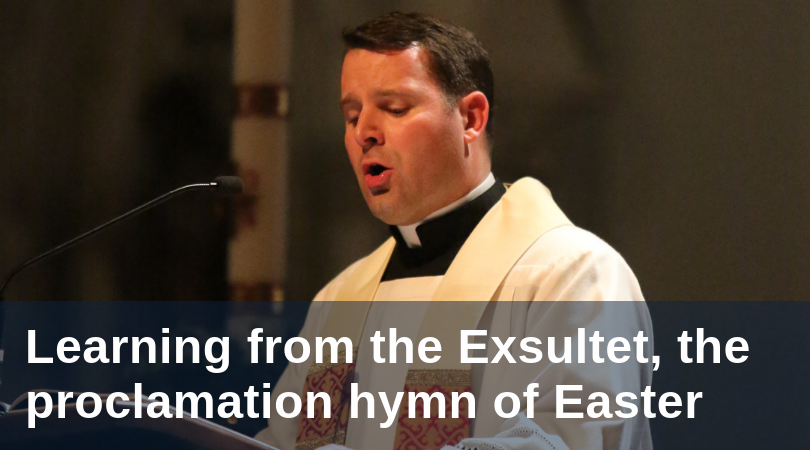
Has your church sent out formal invitations to the Easter Vigil on the evening of Holy Saturday? Don’t worry. The most eloquent words of invitation are front-loaded right into the Easter Vigil liturgy itself. Beginning with the instruction that we in the pews, the whole Church, our world and the angels in heaven should get ready to “exult” tonight, the Proclamation of Easter calls us, in its own words, to an “ardent love of mind and heart.”
Connecting us to past, present and future
The Latin name for this all-encompassing, centuries-old proclamation of praise and thanksgiving is the Exsultet. Its panoramic poetry, centered on the Paschal Candle cutting through darkness, invokes a “sanctification of light and night, of place and time, of priest and faithful for the celebration of the Resurrection of our Lord,” as Rev. Jerome Gassner, OSB, describes it online.
I would add that this prayer’s chanted words connect us to past, present and future. They also honor both our access to eternal happiness and our temporal experience of God’s gradual, providential work in our lives. My favorite part of the Exsultet speaks of the “happy fault” of Adam’s sin that won for us so great a Savior.
O truly necessary sin of Adam,
destroyed completely by the Death of Christ!
O happy fault
that earned for us so great, so glorious a Redeemer!
Another highpoint is the repeated phrase, “This is the night,” first referring to the Lord’s merciful love in the Old Testament and then recalling when Christ’s gift of self “burst the bonds of death.”
This proclamation is truly an invitation for families and parishes. If you’re a parent who wants to impress upon your children how history is essential to appreciate our circumstances today and tomorrow, or if you’re a religious educator struggling to keep eternity on parishioners’ radar screens amid a spontaneous, empirical, short-attention-span culture, the Exsultet is for you.
This is the night, but savor the fullness of time
One word you might consider in contemplating the Exsultet is “timeful.” I recently saw a televised panel of book authors in which geologist Marcia Bjornerud discussed her 2018 book, Timefulness: How Thinking Like a Geologist Can Help Save the World. Her thoughts focused on material matters, rather than spiritual; she said she had coined the “timefulness” term as a deliberate counterpoint to “timelessness.” The latter word, she explained, is “something we think we should aspire to, which is outside the realm of time, but which ultimately is a kind of sterile idea.”
Watching this event on Book TV, I saw value in Bjornerud’s arguments. “Everything has a past and evolves and is more interesting because of that history,” she said, adding that “the past is very much present” in such things as rocks and mountain ranges. She also praised geology for providing “an etymology of the world” if we probe sufficiently into items’ stratifications of change and meaning over time.
But give me the Exsultet as an even better invitation to understand and love the world around us. I can accept a concept of timefulness that respects humanity’s need to put the present moment in context, trusting in God’s timing. But it still may miss the bigger picture that extends beyond time and transcends nature.
An invitation to a brighter future
The Easter Vigil immerses us in the timeless providence of God the Father and Christ’s gift of redemption. But the Exsultet introduces that Saturday night celebration with a poem about salvation history. It reveals in specifics of our past—and in the Paschal Candle—our ongoing passage of darkness into light, led by the Lord.
By sending us His Son to die and rise for us, and by acts of love beginning in the Old Testament, God shows us how He acts through the ages. The past is prologue to an even brighter future, so we want to embrace the mission to receive and spread the Good News of mercy we need throughout life. “O happy fault!”
Photo credit: Roman Catholic Archdiocese of Boston, Flickr, some rights reserved


